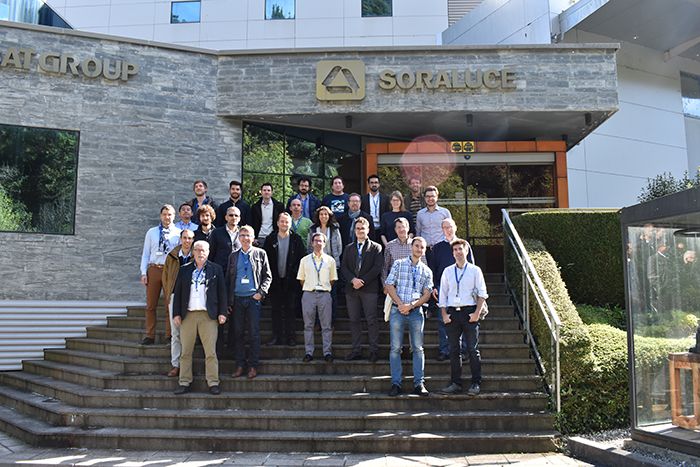Last news about IDEKO.

The European project Coroma, led by the Basque technological centre IK4-IDEKO, analyses the progress made one year after its launch
With a budget of 7 million euros, the project develops robotic applications capable of interacting with people in safe environments
To boost its competitiveness, the industrial sector faces the challenge of integrating the advances of digital technologies in production plants. In this scenario, smart robotics, a branch of engineering that makes it possible to perform complex tasks by applying industry 4.0 concepts, plays a relevant role.
The main objective of the European project COROMA (Cognitively Enhanced Robot for Flexible Manufacturing of Metal and Composite Parts) , launched a year ago and coordinated by the Basque technological centre IK4-IDEKO , is to develop of a new smart robotic system capable of executing multiple manufacturing processes, and to construct parts for sectors of high value-added sectors such as aeronautics, shipbuilding or power generation.
To analyse the progress of the project, launched in October 2016, the consortium partners held a meeting at the Elgoibar technology centre and at the facilities of the machine tool manufacturer SORALUCE, a world leader in milling and boring technology, who are also involved in the initiative.
The leaders of the different work groups and the Independent Advisory Board overseeing the project met last week to discuss the overall approach to the initiative and the progress made so far. The most suitable manner to continue in the coming years to ensure both the transfer of the results to industry and the dissemination to the European community was also discussed.
COROMA's Independent Advisory Board is made up of leading professionals in the field of robotics, research, education, industrial manufacturing and security, and strives to steer the work being carried out and to guarantee industrial exploitation of the results of such work.
"One of the key aspects pursued by the COROMA partners is the exploitation of the obtained results. Periodic monitoring together with the Independent Advisory Council is an optimal way to successfully align work towards that goal" said Javier Hernández, coordinator of the initiative.
In addition to the meetings with the Council, the project partners held a technical workshop to advance in the integration of the different modules that form part of the robotic system with a central controller.
"The objective of the workshop was to advance the development of the general supervision structure to secure a smooth interaction of different COROMA modules in one single final integral system". The expert continued to explain: "The companies involved in the project have the mission of building flexible prototypes that can carry out different tasks, and to achieve this the robots must be designed in a modular way".
COROMA has the mission to develop a smart singular robotic system to perform numerous manufacturing tasks that is adaptable to production requirements. Specifically, the new system will carry out tasks such as drilling, contouring, deburring, polishing, sanding, non-destructive inspections and can even be used as a moving support for the manufactured parts themselves.
The meetings, held between 9 and 11 October, helped to pool all progress made in each project module. Hence, checks were carried out through tests with laser tracker technologies for the characterisation of the robot, and besides the solutions for detection of people in work environments and for avoiding human-robot collisions were tested.
Furthermore, the results of the machining tests, on both aluminium parts and composite materials, as well as the digitization work and integration of tasks of different modules in one single robotic system were analysed and grouped together.
In order to address the scientific and informative dimension of the project, COROMA officials will attend next year's conference on production systems of the International Academy of Production Engineering (CIRP), a leading body in research applied to manufacturing, that will be held in Stockholm in May. At that meeting, researchers from IK4-IDEKO and 3 other research centres will present several papers focusing on the field of robotics applied to manufacturing.
They will also participate in the European Robotics Forum 2018, which will take place in Finland early next year.
With a budget of more than 7 million euros, of which 6 have been funded by the European Commission through the Factories of the Future program to boost research and innovation, the COROMA project has a total of 16 participants consisting of companies, research centres and universities from seven different countries.
The initiative, which will conclude in 2019, involves the companies Aciturri, ENSA and Beneteau, who will implement the industrial exploitation demonstrators in the aeronautical, energy and shipbuilding sectors.
Also present in the project are the University of Nantes , the University of Sheffield , the Royal Technology Institute of Stockholm , the German Research Centre in Artificial Intelligence , the manufacturer of robots Stäubli , the companies Convergent Information Technologies , IT+Robotics, BA Systemes , Shadow Robot Company and Europe Technologies and the German Organization for Standardization.
About IK4-IDEKO
The Basque Technological Centre IK4-IDEKO has a long-standing experience of 30 years in research, development and innovation of new technologies applied to manufacturing and industrial production.
Set up to respond to highly technological challenges from the Mondragon Corporation machine tool companies, today it has more than 100 researchers and a portfolio of more than 50 customers a year.
Its R&D&I is aimed at offering innovative solutions to improve competitiveness of the business fabric, and is structured in 4 research units: Dynamics and Control, Manufacturing Processes, ICT and Automation and Design and Precision Engineering.